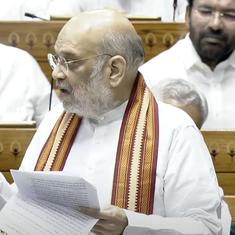Is the Indian economy now bigger than that of the United Kingdom? Despite what you may have read, the answer to that, right now, is no.
Over the past few days, the Indian press has been brimming with articles proudly proclaiming this new “fact.” The Times of India, the Indian Express and the Economic Times, among others, have hailed the milestone of India overtaking its former colonial ruler for the first time in 150 years. India’s minister of state for home affairs tweeted the story as fact. A national vice president of the ruling Bharatiya Janata Party retweeted the story with a photo of Prime Minister Narendra Modi as evidence of his government’s success. Not to be outdone, a whole slew of global outlets ran with it: Sputnik International, Irish Independent, the Daily Mail, the Independent.
A similar story even made it to the US-based Foreign Policy magazine. “India Overtakes Britain as the World’s Sixth-Largest Economy,” declared the headline. In all of these stories, nowhere did anyone question the basis of the “news” or where the underlying data originated – except for one paper, The Hindu. How this meme spread illustrates a failure in the most basic function of reporting: fact-checking.
Anatomy of a mistake
Here’s the anatomy of the media failure. Nearly a week ago, Forbes.com (to which I occasionally contribute opinion pieces) ran an opinion piece titled, “India’s Economy Surpasses That of Great Britain.” The author reasoned that the decline in the value of the British pound post-Brexit had reduced the size of the UK’s gross domestic product in dollars at market exchange rates to around $ 2.29 trillion. The author then provided back-of-the-envelope calculations to show that the Indian economy, assumed to be Rs 153 trillion for 2016, would be larger than the UK’s using an exchange rate of Rs 66.6 to $1, delivering a projected size of the Indian economy of $2.30 trillion.
This conclusion, which appears never to have been anything other than a rough comparison to make a point, is extremely sensitive to exchange rate fluctuation. On the actual date the Forbes.com opinion piece ran, the Rupee to dollar exchange rate was not 66.6 but rather 67.8, so the conclusion was wrong even as it was published, since India’s GDP would not be larger than the UK’s at that rate. This would have been a very easy fact to check.
Secondly, as TCA Sharad Raghavan uncovered through appropriate fact-checking, it is not entirely clear that the figure of Rs 153 trillion as the size of India’s GDP for 2016 is correct. Raghavan reports that IMF estimates from the most recent World Economic Outlook database update (as of October) for the size of the Indian economy at constant prices, and Indian government half-year statistics for 2016, would put the Indian economy between Rs 122 and 143 trillion. As importantly, these are all moving targets. No one knows what the actual effect of the November 8 demonetisation will do to the Indian economy for 2016. Signs clearly point to a dampening effect, but actual metrics are not yet available.
As far as I can tell, the Forbes.com opinion piece, with its proclamation that the Indian economy had overtaken the UK’s, morphed into a “report” in the Indian press articles. Then India’s minister of state for home tweeted one of these. Some international news outlets ran the story on the basis of the Indian minister’s tweet. Foreign Policy ran their story based on the Indian press reports. Some more international news outlets ran the story based on the Foreign Policy contribution to this fact-free meme. In this way, one thought experiment turned into an international story divorced from any firm basis in fact.
Silver lining
Kudos go to two media outlets that did their jobs. Two days ago I was contacted by Peter Holley of the Washington Post. He sought to fact-check the “India overtakes the UK” claim. Neither of us could identify any underlying data beyond the Forbes.com opinion piece. Holley concluded that the proclamation could not be verified, so dropped the story. Today I was heartened to read Sharad Raghavan’s fine reporting in The Hindu, in which he dug into this claim further through Indian ministry of statistics data and interviews with economic analysts. The Hindu’s story ran as a “Reality Check.” This is the job of reporting: to check claims, dig a little deeper, and look for truth.
Now, I understand why the story caught fire. There’s a just-rewards aspect to the notion that the once-colonised India has overtaken the once-colonial power. And that is going to happen, very soon, just based on differential growth rates. The standard IMF estimate sees this taking place in 2020; who knows, it could happen sooner. As I argue in my forthcoming book, Our Time Has Come: How India is Making Its Place in the World, the Indian economy has grown much larger than many people realise or acknowledge, and it still has terrific headroom for further growth.
At market exchange rates, India is already the world’s seventh-largest economy, ahead of Canada, Brazil, and Italy. (Russia isn’t even in the top 10.) In purchasing power parity terms, India became the world’s third-largest economy in 2011, behind the United States and China. So India is a major global economic force and appears poised to grow even further into that role.
But as of today, the Indian economy hasn’t overtaken the UK’s. Sorry, Indian media, you will have to wait a bit longer for that.
The Indian Economy Has Not Overtaken the UK (But It Will, Soon) was first published on the site of the by the Council on Foreign Relation.










